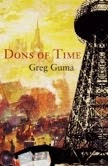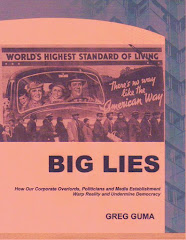This Week: Losing and winning on Gay Marriage, Bush Watch – secret operations and last minute assaults, Barack as Marketer-in-Chief, Cheney’s Midas touch, Forecasting the next crisis, South America just says no (to the drug war). Greg’s Comment: Honeymoon in Limbo. Live Broadcast Friday, November 14, Noon EST, on The Howie Rose Show (WOMM), streamed on The Radiator.
Years ago, back in school, I remember being told by a professor that one of the ways to tell whether someone was well-educated is a high tolerance for ambiguity, the ability to deal with less than clear cut situations. To some extent, Bush came to power because a majority of voters liked his black-and-white view of the world, his basic rejection of ambiguity. You were either with him – or with the terrorists. One reason John Kerry lost in 2004, among many, was that his view of the world was too “nuanced.”
But perhaps people have learned a bit in the last eight years. This time, forced to choose between an “all American” war hero offering the same old black-and-white logic, and an exotic challenger with a clear yet nuanced agenda, America – except for a shrinking stronghold of insular simplicity – choose the more complex option.
Maybe the country is growing up. Maybe it’s ready to deal with ambiguity, with problems too complex for simple sound-byte answers. Let’s hope so, since the next months – and probably years – are likely to be even more challenging to many basic assumptions than the Bush era. The world’s only Superpower? Maybe, maybe not. Axis of evil? Too simple to be true or very helpful. The clear line between friends and enemies? It could begin to blur.
As much as we yearn for clear and simple outcomes, and a clear break with the past, we also know that it doesn’t usually work out that way. More likely, the changes ahead will be gradual, subtle, nuanced. You know, something old, something new, some things borrowed, and, for the next four years, basically blue.
I could be wrong, but the future is apt to be a little like a new marriage, the time when you begin to discover the real, complex nature of the person you’ve decided to trust and live with. It’s confusing all right. But if the country has really developed a higher tolerance for ambiguity – an ability to handle uncertainty and adapt, despite all the mixed messages – the honeymoon we’re on could end up being an exciting time of discovery, a chance to create a more perfect, yet continually evolving union.
NEWS
GAY MARRIAGE: SETBACKS & STRATEGIES. The passage of California's Proposition 8, an amendment to the state Constitution banning gay marriage, may be due largely to $14 million in donations from members of the Church of Jesus Christ of Latter-Day Saints, the Mormons. That has set off Irony Alerts across the country, given the Church's onetime support of polygamy. For the record, the Mormons disavowed polygamy in 1890 so that Utah could become a state, but Maverick Mormons continue to practice it.
A day after the vote, the issue returned to the state Supreme Court, since gay and lesbian couples and the city of San Francisco have filed lawsuits seeking to overturn it. Attorney General Jerry Brown says he’ll defend the legality of about 18,000 same-sex marriages conducted in the months leading up to election day. Prop. 8 backers claim the measure was intended to invalidate those marriages. That issue is also expected to end up before California's high court. It could even reach the US Supreme Court.
Backers of Prop. 8 accuse "activist judges" of thwarting the will of voters, who approved a similar measure in 2000. Last May the California High Court ruled that same-sex couples had the right to marry under the California Constitution on the grounds of privacy and equal protection.
The new lawsuits seek to overturn Prop. 8 on the basis of state law, but avoid federal constitutional claims. The reason: Gay rights activists are worried that the Supreme Court would reject any right of same-sex marriage under the Constitution.
On the plus side, Connecticut legalized gay marriage this week. A month ago that state’s Supreme Court said that excluding same-sex couples from marriage was unconstitutional. A week ago the court announced that marriages could officially be performed starting on Wednesday. With California out of the picture, Massachusetts and Connecticut are the only states allowing same-sex marriage. New Jersey, Vermont and New Hampshire have civil unions, and California has domestic partnerships
Vermont could get back into the mix. According to Vermont Freedom to Marry, support for same-sex marriage in the Green Mountains is strong enough that 2009 may be the time to go for it. This November no one running for the Vermont state legislature lost a seat due to the issue. At eight public hearings held by the Vermont Commission of Family Recognition and Protection, support for marriage rights had a 20 to 1 advantage in testimony. The plan is to bring gay marriage to Vermont in the next six months.
BUSH WATCH
PART ONE: WHAT WE DON’T KNOW. Since 2004 the US has used broad, secret authority to carry out nearly a dozen previously undisclosed attacks against Al Qaeda and other militants in Syria, Pakistan and elsewhere, according to senior American officials. Defense Secretary Donald Rumsfeld authorized the raids, with Bush’s approval. This gave the military authority to attack al Qaeda anywhere in the world, plus a sweeping mandate to conduct operations in countries not at war with the US. Among other places, commandos have been sent into countries like Pakistan and Somalia. So, don’t think the Bushies have just been sitting around.
PART TWO: EXIT STRATEGY. If you think the Bush administration is basically over, think again. In the next few weeks, Bush is expected to finalize 90 last-minute regulations. This includes relaxing environmental-protection rules on power plants near national parks, uranium mining near the Grand Canyon, and more mountaintop-removal coal mining in Appalachia. The administration wants the rules in place before Thanksgiving.
Why the rush? Because, once a federal regulation has been in effect for 60 days it can’t simply be reversed by presidential action. This means that as of January 20, President Obama would be unable to undo regulations finalized by November 22. Sounds like big trouble.
But the "little-known" Congressional Review Act of 1996 was passed to address just such a situation. It allows Congress to undo these last-minute regulations "with a joint resolution that can’t be filibustered." Obama reportedly has a team of people trying to unravel the complex web of executive orders and regulations. It could end up being handled by one giant Get Rid of Bush Bill.
MARKETER IN CHIEF. Barack Obama actually won two races this year. Not only has he become president, he’s has been named Advertising Age's 2008 Marketer of the Year. Hundreds of marketers, agency heads and marketing-services attending the annual Association of National Advertisers conference voted for Obama's campaign over ad campaigns by major companies like Apple, Zappos, Nike and Coors. AdAge called Obama's win the "biggest day in the history of marketing," saying marketers have a lot to learn from this campaign.
At a time when 70 percent thought the country was headed in the wrong direction, Obama adopted a simple slogan – "Change" – and it never varied. Hillary Clinton tried the slogan "Experience," then shifted to "Countdown to change,” then "Solutions for America." McCain tried on a long list of labels – "Maverick," "Straight Talker," "Conservative" and "Hero." By the time his campaign settled on "Country First," it was too late. The ad experts admire the simplicity, consistency and relevance of Obama’s campaign. He isn’t just leading a movement, he’s a marketing bonanza. Magazines with his and Michelle’s pictures on the cover are flying off the shelves.
So, McCain was right. He’s a celebrity…but you know what ends up happening to them.
NO MORE DICK? Could we have seen the last of Dick Cheney? Perhaps his last act was to put the final nail in John McCain’s coffin – and his own. Here is Cheney, endorsing the Mac in Laramie, Wyoming on November 1, 2008, just three days before the election.
WHAT’S NEXT? In recent weeks we’ve heard a series of dire predictions about what may be facing the world and the next US president in the months ahead. The first discouraging words came in mid-October from Lord West, who advises the UK Prime Minister on security matters. "There is another great plot building up again,” he announced. "We have done all the things that we need to do, but the threat is building.”
Two weeks ago England’s Daily Telegraph reported that security sources believe terrorist activity is nearing "critical." The threat level is at the "severe end of severe," say sources. The level of "ambient activity" among terrorist cells has increased, and they are now operating at full stretch.
On October 20, VP candidate Joe Biden added to the speculation.”We're gonna have an international crisis, a generated crisis, to test the mettle of this guy,” he said. “I can give you at least four or five scenarios from where it might originate.” On the same day, the newly formed International Commission on Nuclear Non-proliferation and Disarmament announced that the world is on the brink of an avalanche in the spread of devastating weaponry. There is also top Obama advisor Zbigniew Brzezinski, who told CNN on November 2 that Barack Obama will be faced with "imminent problems" in foreign policy once he takes office.
The most disturbing prediction comes in a disputed report, supposedly by the Rand Corporation, a leading Pentagon think tank. Rand denies that it issued the report, which recommends that the US can save its economy by starting another war. And who might we be preparing to face -- hot or cold? Most likely, Russia, China, or Iran.
So, what will Obama do? He’ll face two wars, plus a world financial and economic crisis, and a melting planet. The hope is that he’ll close Guantánamo, begin the withdrawal from Iraq, sign a peace treaty with North Korea, terminate Star Wars, and bring the war on terror to an end. But the signs aren’t that good. Obama calls Afghanistan the “central front” in the “War on Terror” and wants more military action against insurgents allied with the Taliban. Still, he could change his mind, like he did on public financing of his campaign.
SOUTH SAYING NO TO THE DRUG WAR. The latest word from parts of Latin America on the US drug war is pretty blunt: Get out of town. Bolivia has given US Drug Enforcement Administration three months to leave the country. Bolivian President Evo Morales, who rose to power as head of the coca grower's federation, claims that DEA agents have been stoking up divisions in a country already divided over a new Constitution that gives the state control over energy resources.
Ecuadorians have also voted for a new Constitution. This one calls for the closure of one of the most important US operations in its drug war, the Manta airbase. President Rafael Correa calls it a matter of reciprocity. During a visit to Italy last year, he joked that if the US wants its base to remain, it will have to allow an Ecuadorian base in Miami.
In addition, the DEA presence in Venezuela has been dramatically reduced in the past 18 months. State Department officials characterize this as evidence of Venezuela's weak support for international antinarcotics effort. For the fourth year in a row, Venezuela has been singled out by President Bush – as was Bolivia for the first time – for having "failed demonstrably" in antidrug cooperation.































No comments:
Post a Comment